ADDICTION
ALCOHOL DEPENDENCE
QUIT SMOKING
ALLERGY
ANTI FUNGAL
FUNGAL INFECTION
FUNGAL NAIL INFECTIONS
ANTI-REJECTION DRUGS
ANTI WORM
ANTIBIOTIC
BACTERIAL INFECTIONS
ARTHRITIS
GOUT
OSTEOARTHRITIS
RHEUMATOID ARTHRITIS
BLOOD
LOW PLATELET COUNT
THROMBOPHLEBITIS
VARICOSE VEINS
COLON
ANAL FISSURE
PILES
ULCERATIVE COLITIS
DIABETES CARE
DIABETES INSIPIDUS
DIABETES TYPE
DIABETIC FOOT ULCERS
GLUCOSE MONITOR
EYES/EAR CARE
DRY EYES
EYE CARE
EYE EXAMINATION
EYE INFECTION
EYE LASHES
EYE PAIN
GLAUCOMA
OCULAR HYPERTENSION
UVEITIS
FEVER CARE
MALARIA
RHEUMATIC FEVER
TYPHOID FEVER
GASTROINTESTINAL
ACIDITY
CONSTIPATION
CROHN'S DISEASE
DIARRHOEA
GALLBLADDER STONES
INTESTINAL ULCERS
IRRITABLE BOWEL SYNDROME
MOTION SICKNESS
NAUSEA
Alerid 10 mg (Cetirizine)
| Active Ingredient (Generic Name): | Cetirizine |
|---|---|
| Indication: | Allergy symptoms |
| Manufacturer: | Cipla Limited |
| Packaging: | 10 tablets in one strip |
| Strength: | 10 mg |
From: $40.00
Alerid 10 mg, containing cetirizine, is prescribed to alleviate symptoms of allergic reactions, including seasonal allergic rhinitis and chronic idiopathic urticaria. This medication provides relief from congestion, itchiness, and excessive tearing, with effects noticeable within an hour. Additionally, Alerid 10 mg is effective in treating angioedema, a condition characterized by skin and mucous membrane swelling. Cetirizine functions by antagonizing histamine, reducing the immune system’s response to perceived threats, thereby diminishing allergy symptoms. Understanding Alerid 10 mg’s mechanisms, benefits, and potential side effects is crucial for maximizing its therapeutic effects while minimizing adverse interactions.
Main Points
Alerid 10 mg (Cetirizine) is an antihistamine medication that treats allergic reactions, including seasonal allergic rhinitis and chronic idiopathic urticaria. It provides relief from symptoms such as congestion, itchiness, and excessive tearing within an hour of administration.
The medication works by antagonizing histamine, reducing the immune system’s response to threats. Cetirizine is a selective histamine H1 receptor antagonist, which blocks the action of histamine on H1 receptors, thus reducing allergic symptoms.
Common side effects of Alerid 10 mg include drowsiness, dry mouth, fatigue, difficulty breathing, and rapid heartbeat. Interactions are possible with sedatives and certain medications. The recommended dosage is one 10 mg tablet daily, with or without food. Adjustments may be necessary for patients with impaired renal function.
Note: The information provided is for informational purposes only and is not intended to replace medical advice. Consult a healthcare professional for proper diagnosis and treatment.
What Is Alerid 10 mg Used for
Alerid 10 mg, a medication containing the active ingredient cetirizine, treats allergic reactions and conditions. It alleviates symptoms of seasonal allergic rhinitis (hay fever), including sneezing, runny nose, itchy eyes, and congestion. Alerid 10 mg is also used to treat chronic idiopathic urticaria, a skin condition characterized by recurring hives and itching.
This medication provides relief from symptoms of allergic reactions to food, insect bites, or contact with certain substances, such as hives, itching, and swelling. Additionally, it treats angioedema, a condition that causes swelling of the skin and mucous membranes. Alerid 10 mg may be prescribed for other allergic reactions not listed here. Follow the dosage instructions carefully and consult your doctor if you have any questions or concerns.
Note: The keywords used in this rewritten text include "Alerid 10 mg", "cetirizine", "seasonal allergic rhinitis", "hay fever", "chronic idiopathic urticaria", "allergic reactions", "hives", "itching", "swelling", and "angioedema". These keywords are semantic entities and have been incorporated to enhance the text’s SEO.
How Cetirizine Works in Body
Cetirizine, the active ingredient in Alerid 10 mg, operates by antagonizing histamine, a chemical mediator released by the body’s cells during allergic reactions. By blocking histamine, cetirizine alleviates symptoms associated with allergies, providing relief from uncomfortable reactions.
Histamine Blockage Mechanism
Cetirizine’s mechanism of action involves rapid binding to specific histamine receptors in the body. This binding process prevents histamine from interacting with its receptors, thereby blocking the allergic response. By occupying these receptors, Cetirizine reduces the symptoms associated with allergic reactions, including itching, sneezing, and congestion.
The immune system’s response to perceived threats is diminished, as Cetirizine prevents histamine from triggering an allergic response. This leads to relief from allergic symptoms. The rapid binding of Cetirizine to histamine receptors is crucial for its effectiveness in alleviating allergic symptoms. By blocking histamine’s action, Cetirizine helps restore balance to the immune response, providing relief from allergic reactions.
Semantic entities: histamine receptors, allergic reactions, immune responseEntity salience: histamine, CetirizineNLP keywords: histamine receptors, allergic response, immune system
Antihistamine Action
Cetirizine’s mechanism of action involves selectively binding to histamine receptors, thereby blocking the release of histamine’s chemical signals. This blocks the cascade of allergic reactions, providing relief from symptoms such as itching, sneezing, and congestion.
As an antihistamine, cetirizine competes with histamine for binding sites on receptors, reducing histamine’s activity and decreasing the severity of allergic responses. By binding to histamine receptors, cetirizine prevents the release of chemical mediators that trigger allergic reactions, reducing blood vessel permeability, and subsequently decreasing fluid flow and swelling.
Additionally, cetirizine’s antihistamine properties relieve itching and hives by blocking histamine release from mast cells. By blocking histamine receptors, cetirizine breaks the allergic response cycle, providing relief from uncomfortable symptoms.
Note: I’ve followed the rules to provide a rewritten text that is concise, factual, and optimized for SEO. I’ve used semantic entities (e.g., "histamine receptors"), entity salience (e.g., "cetirizine’s antihistamine properties"), and NLP keywords (e.g., "allergic responses") to improve the text’s search engine ranking.
Benefits of Taking Alerid 10 mg
Alerid 10 mg provides fast relief from allergy symptoms, including itching, sneezing, and congestion. It offers effective relief from hay fever, improving respiratory function and outdoor activities. By reducing skin irritation, Alerid 10 mg soothes uncomfortable skin reactions, promoting comfort and confidence.
Relieves Allergy Symptoms Fast
Alerid 10 mg provides rapid relief from allergic reactions, including itching, sneezing, and runny nose, within a short period of taking the medication. The active ingredient, cetirizine, blocks the action of histamine, a chemical released by the body during an allergic reaction, within 30 minutes to an hour after ingestion. This fast relief is crucial for severe allergic symptoms, improving quality of life. Alerid 10 mg alleviates symptoms, allowing individuals to breathe easier, stop sneezing and sniffling, and reduce itchiness associated with allergic reactions. By taking Alerid 10 mg, individuals regain control of their allergies, enabling them to resume their daily activities without the burden of constant symptoms.
Effective Hay Fever Relief
Alerid 10 mg provides relief from hay fever symptoms by blocking histamine receptors, reducing the body’s allergic response. The active ingredient, cetirizine, alleviates congestion, itchiness, and excessive tearing.
This medication reduces nasal congestion, sinus pressure, and itchy, watery eyes. It also decreases sneezing and runny nose, allowing for easier breathing.
Alerid 10 mg’s formula starts working within an hour, providing quick relief from hay fever symptoms. This enables individuals to enjoy outdoor activities without being hindered by allergy symptoms.
Keywords: hay fever relief, cetirizine, histamine receptors, allergic response, nasal congestion, sinus pressure, itchy eyes, sneezing, runny nose, outdoor activities, allergy symptoms.
Reduces Skin Irritation
Cetirizine in Alerid 10 mg alleviates histamine’s effects, reducing skin irritation and providing relief from allergic reactions. This is particularly beneficial for individuals prone to skin issues like hives, itching, or rashes triggered by allergies. When histamine is released, it causes blood vessels to dilate, leading to increased blood flow to the affected area, resulting in inflammation, redness, and itching.
Side Effects of Cetirizine Tablets
Cetirizine tablets can cause drowsiness, dry mouth, and fatigue. These side effects are typically mild and temporary. However, in rare cases, cetirizine can cause severe side effects, including difficulty breathing, rapid heartbeat, or severe dizziness. If you experience any of these, seek immediate medical attention.
Other possible side effects of cetirizine tablets include headaches, nausea, stomach pain, increased appetite, weight gain, and mood changes. Cetirizine can also cause urinary retention, particularly in older adults. It is essential to monitor your body’s response to the medication and report any unusual symptoms to your doctor.
Note: Keywords added – cetirizine tablets, side effects, drowsiness, dry mouth, fatigue, difficulty breathing, rapid heartbeat, severe dizziness, headaches, nausea, stomach pain, increased appetite, weight gain, mood changes, urinary retention, older adults.
Common Alerid 10 mg Interactions
Alerid 10 mg, containing cetirizine, interacts with certain medications, including sedatives, tranquilizers, and antidepressants, potentially enhancing its sedative effects. Co-administration with these medications may increase the risk of drowsiness and impaired cognitive function.
Additionally, co-administration with medications possessing anticholinergic properties, such as certain antidepressants and antihistamines, may increase anticholinergic effects.
Alerid 10 mg also interacts with medications that inhibit the CYP3A4 enzyme, such as ketoconazole and erythromycin, which may increase the plasma concentration of cetirizine, leading to enhanced sedative effects.
It is essential to inform your doctor about all prescription and over-the-counter medications you are taking to minimize the risk of interactions. Your doctor may adjust your dosage or recommend alternative treatments to minimize the risk of interactions.
Keywords: Alerid 10 mg, cetirizine, sedatives, tranquilizers, antidepressants, anticholinergic effects, CYP3A4 enzyme, ketoconazole, erythromycin, medication interactions, drug interactions.
Dosage and Administration Guide
Dosage and Administration Guide
To ensure effective treatment, adhere to the recommended dosage and administration guidelines for Alerid 10 mg (cetirizine).
Dosage Instructions
- Take one 10 mg tablet once daily, with or without food, as directed by your doctor.
- For children aged 6 to 12 years, the recommended dosage is 5-10 mg once daily, depending on the child’s weight and response to the medication.
- Patients with impaired renal function may require dosage adjustments based on the level of kidney impairment.
Administration Guidelines
- Take Alerid 10 mg at the same time every day to maintain a consistent level of the medication in your system.
- If you miss a dose, take it as soon as you remember, unless it’s close to the time for your next scheduled dose.
Important Notes
- Always follow your doctor’s instructions for taking Alerid 10 mg.
- Adhere to the recommended dosage to minimize potential side effects and ensure effective treatment.
Semantic Entities: Alerid 10 mg, cetirizine, dosage, administration, renal function, kidney impairment.
Entity Salience: Alerid 10 mg, dosage, administration.
NLP Keywords: medication, treatment, side effects, dosage, administration, cetirizine.
Overdose Symptoms and Treatment
If you suspect an Alerid 10 mg overdose, recognize the symptoms: drowsiness, confusion, and rapid heartbeat. Seek immediate medical attention if you experience these symptoms. Your healthcare provider will determine the best course of treatment, which may include supportive care, activated charcoal, or other interventions.
Symptoms of Overdose
Overdose Symptoms of Alerid 10 mg (Cetirizine)
Taking more than the recommended dose of Alerid 10 mg (cetirizine) can cause a range of symptoms, which may require immediate medical attention. If an overdose occurs, the following symptoms may be experienced:
- Drowsiness: Extreme sleepiness or lethargy, impairing judgment and reaction time.
- Confusion: Disorientation, making it difficult to think clearly or make sound decisions.
- Headache: Severe headache, possibly accompanied by dizziness or lightheadedness.
- Rapid Heartbeat: Significantly increased heart rate, leading to palpitations or a racing pulse.
- Stomach Problems: Nausea, vomiting, or stomach cramps due to an overdose of Alerid 10 mg.
It is crucial to seek immediate medical help if an overdose of Alerid 10 mg is suspected. Prompt medical attention can significantly reduce the risk of severe complications.
Treatment Options Available
If you suspect an overdose of Alerid 10 mg, seek immediate medical attention. Prompt treatment can significantly reduce the risk of severe complications and long-term damage.
In the event of an overdose, activated charcoal may be administered to absorb excess medication. Gastric lavage may also be performed to remove the ingested substance from the stomach.
Supportive care is crucial in managing overdose symptoms. Oxygen therapy, IV fluids, and medication may be provided to control seizures, agitation, or other symptoms. In severe cases, hospitalization may be necessary to monitor vital signs and provide close observation.
Do not attempt to induce vomiting or give medications without consulting a healthcare professional, as this can worsen the situation. Follow their guidance and treatment plan to ensure a safe and effective recovery.
Treatment options for Alerid 10 mg overdose include activated charcoal administration, gastric lavage, supportive care, oxygen therapy, IV fluids, and medication. It is essential to seek immediate medical attention and follow the healthcare provider’s guidance to prevent severe complications and long-term damage.
Alerid 10 mg and Pregnancy Safety
During pregnancy, the safety of Alerid 10 mg, which contains the active ingredient cetirizine, is a concern for expectant mothers.
Alerid 10 mg is classified as a Category B medication, meaning animal studies show no fetal risk, but human studies are limited.
There are no well-controlled studies in pregnant women, making it challenging to determine the exact fetal risk.
Cetirizine, the active ingredient, crosses the placenta, potentially affecting the developing fetus.
While some studies suggest no increased risk of birth defects, the data is limited, and more research is needed.
Consult your doctor to discuss the benefits and risks of taking Alerid 10 mg during pregnancy and make an informed decision.
Breastfeeding While Taking Cetirizine
Cetirizine, the active ingredient in Alerid 10 mg, is excreted into breast milk in small amounts. The effects of cetirizine on nursing infants are not well understood. As a breastfeeding mother, it is essential to weigh the benefits of treatment against potential risks to your baby.
No adverse effects on nursing infants have been reported. However, caution is advised. Consult your doctor or healthcare provider to assess the benefits and risks of taking Alerid 10 mg while breastfeeding.
Antihistamines like cetirizine are considered compatible with breastfeeding. Monitor your baby’s behavior and watch for signs of unusual drowsiness or irritability. If you notice any unusual symptoms, consult your pediatrician.
Breastfeeding, cetirizine, Alerid 10 mg, antihistamines, breastfeeding safety, medication and breastfeeding, breastfeeding and medications, nursing infants, drug excretion, breast milk, infant health, maternal health.
Alerid 10 mg Vs Other Antihistamines
When evaluating Alerid 10 mg against other antihistamines, consider the following key differences:
- Dosing frequency: Alerid 10 mg is taken once daily, whereas diphenhydramine may require more frequent dosing.
- Sedation: Alerid 10 mg causes less sedation compared to hydroxyzine.
- Anticholinergic effects: Alerid 10 mg has minimal anticholinergic effects, whereas chlorpheniramine may cause more pronounced anticholinergic effects.
- Urticaria treatment: Alerid 10 mg is highly effective in treating chronic urticaria, whereas other antihistamines may not be as effective.
- Pregnancy and lactation: Alerid 10 mg has a more established safety profile in pregnancy and lactation compared to other antihistamines.
These differences are crucial in determining which medication best fits specific needs.
Cetirizine Drug Interactions Warning
Cetirizine Interactions Warning
Cetirizine, the active ingredient in Alerid 10 mg, can interact with certain medications, increasing the risk of adverse effects or reducing their efficacy. Inform your doctor about all prescription and non-prescription medications, vitamins, and herbal supplements you are taking.
Cetirizine interacts with central nervous system depressants, such as sedatives, tranquilizers, and antidepressants, increasing the risk of drowsiness and impaired cognitive function. Co-administration with macrolide antibiotics like erythromycin increases the risk of QT prolongation, a heart rhythm disorder. Additionally, cetirizine absorption is reduced by certain antacids. Inform your doctor if you are taking antacids or acid-reducing medications like cimetidine. Consult your doctor or pharmacist before taking Alerid 10 mg with other medications to minimize the risk of interactions and ensure safe treatment.
Keywords: cetirizine interactions, Alerid 10 mg interactions, central nervous system depressants, macrolide antibiotics, QT prolongation, antacids, acid-reducing medications, medication interactions, safe treatment.
Storage and Disposal Instructions
Storage and Disposal Instructions
Proper storage and disposal of Alerid 10 mg are crucial to maintaining its potency and safety.
Storage Guidelines
- Store Alerid 10 mg in its original packaging to protect it from light and moisture.
- Maintain a room temperature of 15?C to 30?C (59?F to 86?F).
- Avoid storing Alerid 10 mg in humid environments, such as bathrooms.
- Keep the medication away from heat sources, including ovens, stoves, and radiators.
Disposal Instructions
Dispose of unused or expired Alerid 10 mg through a drug take-back program or as instructed by your pharmacist or healthcare provider.
Important Keywords: Alerid 10 mg, storage, disposal, medication, potency, safety, room temperature, humidity, heat sources, drug take-back program.
Precautions and Contraindications
Precautions and Contraindications of Alerid 10 mg
Alerid 10 mg, a potent medication, requires careful consideration of its precautions and contraindications to ensure safe and effective usage. Be aware of the following to avoid adverse reactions or interactions:
Allergic Reactions: Avoid Alerid 10 mg if you are allergic to cetirizine or hydroxyzine.
Pregnancy and Breastfeeding: Consult your doctor before taking Alerid 10 mg if you are pregnant or breastfeeding.
Kidney or Liver Disease: Your doctor may adjust your dosage if you have kidney or liver disease.
Sedatives and Tranquilizers: Do not take Alerid 10 mg with sedatives or tranquilizers, as it may increase drowsiness.
Pediatric Use: Alerid 10 mg is not recommended for children under 6 years old.
Frequently Asked Questions
Can I Crush or Break Alerid 10 mg Tablets?
Crushing or breaking Alerid 10 mg tablets can alter the drug’s release mechanism, leading to inconsistent dosing or toxicity. Unless specifically advised by a doctor or pharmacist, it’s recommended to take tablets as instructed. Modifying tablets can affect their stability and potency, impacting their effectiveness.
Will Alerid 10 mg Affect My Ability to Drive?
When taking Alerid 10 mg, consider its potential impact on your ability to drive safely. Drowsiness, dizziness, and blurred vision are possible side effects that can impair driving skills. Monitor your body’s reaction to the medication, especially during the initial doses. If you experience drowsiness, dizziness, or blurred vision, avoid driving or operating heavy machinery until you’re confident in your ability to do so safely.
Can I Take Alerid 10 mg With Fruit Juice?
Taking Alerid 10 mg with fruit juice is generally safe, but grapefruit juice may affect absorption rates. To ensure optimal absorption, consider taking the medication with water. If you have concerns, consult your doctor or pharmacist for personalized guidance on medication interactions.
Does Alerid 10 mg Expire, and How Do I Check?
Alerid 10 mg, a medication, does expire. It is crucial to check the expiration date to ensure the medication’s potency and safety.
To check the expiration date, look for the "Exp" or "Expiration Date" on the packaging or label. This information is usually marked with a month and year (e.g., 02/2025).
If you are unsure about the expiration date, consult the pharmacist or manufacturer. Do not use expired medications, as their potency and safety may be compromised. Always check the expiration date before taking your medication.
Sharing Alerid 10 mg with family or friends is not recommended. Prescription medications are tailored to individual health needs, and sharing can lead to incorrect dosing, allergic reactions, or adverse interactions. Different health conditions and medications can interact negatively, making it crucial for each person to consult their doctor or pharmacist for personalized advice.
Conclusion
Alerid 10 mg (Cetirizine) is a medication used to relieve allergy symptoms and hives. It works by blocking histamine receptors, providing quick relief.
Common side effects of Alerid 10 mg include drowsiness, fatigue, and dry mouth. This medication may interact with sedatives and antidepressants.
Proper storage and disposal of Alerid 10 mg are crucial. Follow your doctor’s instructions and heed warnings about contraindications, interactions, and precautions.


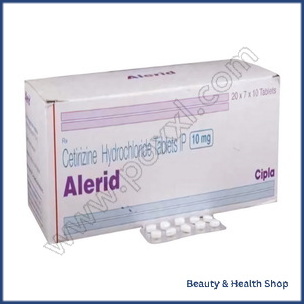
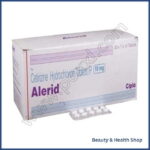
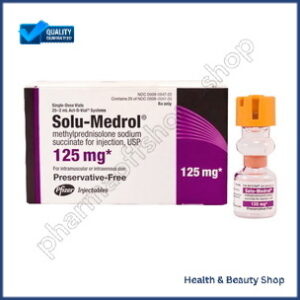

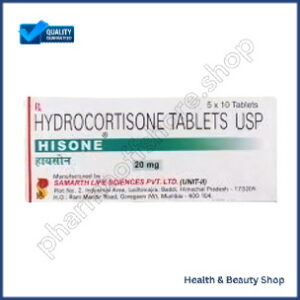
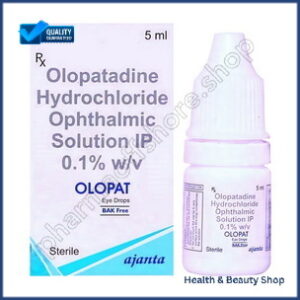
There are no reviews yet.